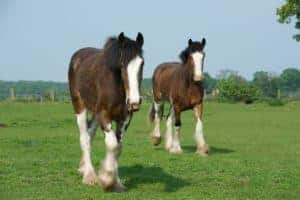Special Report: Kissing Spines are Common in Horses but Not Always Career Ending
- Posted by Stephanie L. Church, Editorial Director
Share:

Kissing, while generally considered favorable in its usual context, isn’t so great when it comes to horses’ vertebral surfaces. Overriding spinous processes — known as kissing spines — can cause severe back pain, said Tracy Turner, DVM, MS, Dipl. ACVS, but not all horses with the condition have complications because of it.
Turner, of Anoka Equine Veterinary Services, in Elk River, Minnesota, performed a study in which he determined kissing spines are more likely to cause clinical problems in certain breeds, disciplines, and ages, and that a particular combination of therapies can produce successful outcomes. Download this special report to read more about the results of Dr. Turner’s study.

Written by:
Stephanie L. Church, Editorial Director
Related Articles
Stay on top of the most recent Horse Health news with














